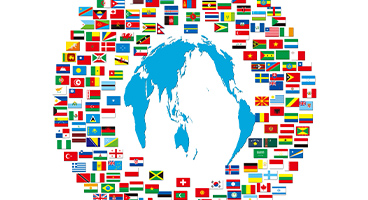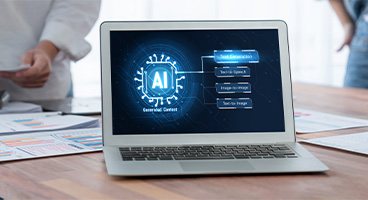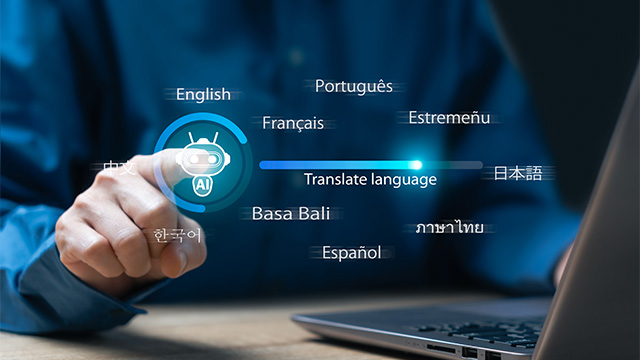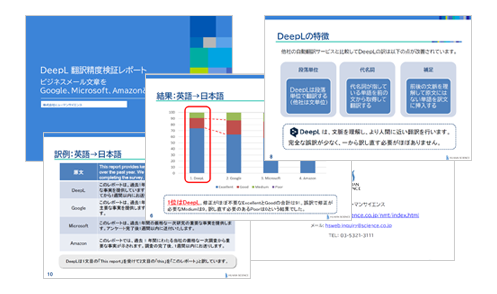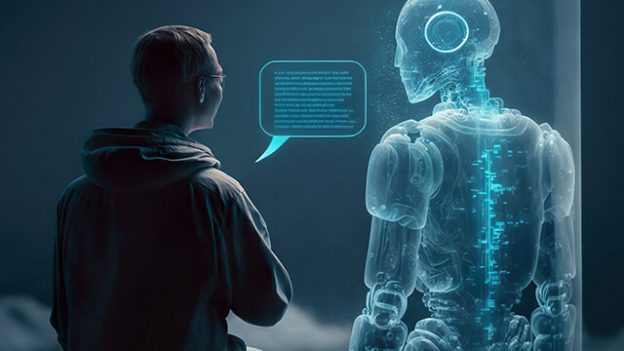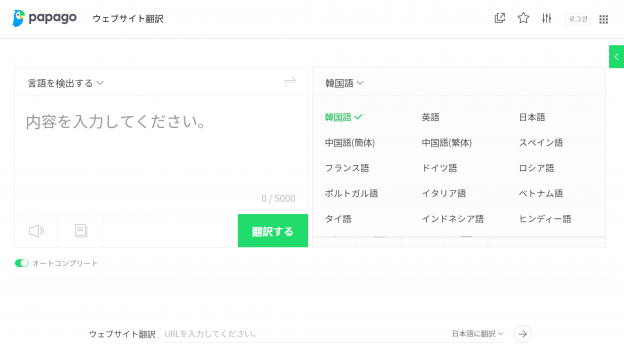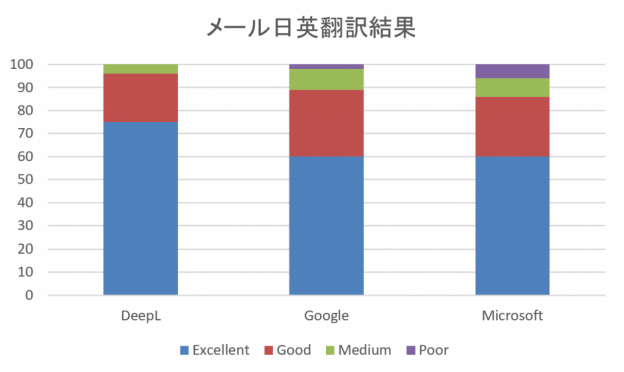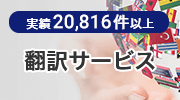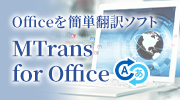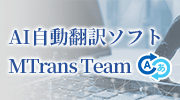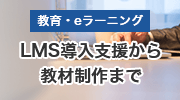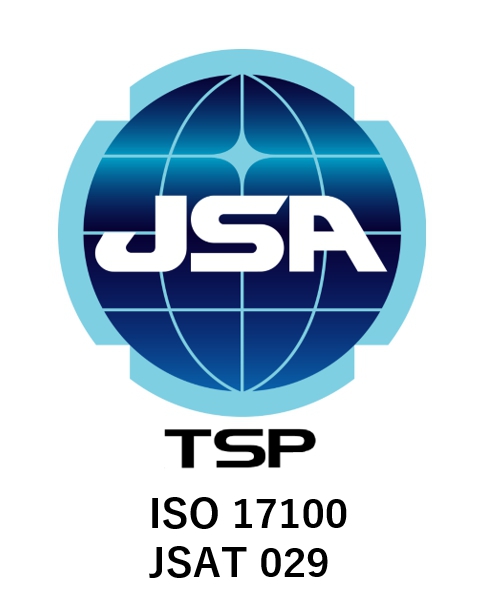On March 19, 2020, the automatic translation service provided by the German company DeepL became compatible with Japanese, gaining attention for its high accuracy. On June 16, 2020, the service officially launched in Japan, attracting even more attention.
On June 9, 2020, Human Science held a webinar on the theme "What is the quality of DeepL automatic translation services? - Comparison with competing services and how to implement them," which many people attended.
In the seminar, we introduced the accuracy verification results of DeepL and Google, categorized by fields such as medical and mechanical.
Here, we will introduce the questions and answers submitted during the seminar.
We are conducting seminars on machine translation on a regular basis.
Please check the upcoming schedule here.
Table of Contents
3. About MTrans Team, MTrans for Trados/Memsource
1. About DeepL
Q Does DeepL often supplement appropriate words according to context compared to other products, but are there also many cases where it supplements incorrect or inappropriate words?
A There are not many, but there are cases where supplementary information can lead to mistranslations.
Q What are the common errors found in DeepL, considering that machine translation using neural networks other than DeepL tends to have issues such as omissions and terminology errors?
A When translating a paragraph that contains multiple sentences, there are times when one entire sentence is omitted from the translation.
Q Is there a difference in performance (such as translation speed)?
A DeepL takes longer than other translation engines. For example, if it takes 0.3 seconds to translate a sentence with Google, it may take DeepL 2 seconds.
Q Is there any information on when it will be possible to learn unique terms for proper nouns in Japanese-English translation in DeepL, following the press release that stated this capability has been introduced for Western languages?
A I don't understand. You can use our unique terminology feature with DeepL in MTrans for Trados/Memsource.
Q What is the secret to high quality? I would like to know beyond just paragraph translations.
A The details are unclear, but DeepL offers the bilingual web search engine Linguee. I believe it was trained based on the vast amount of translation data collected there.
Q Is there a prospect of being able to contract DeepL directly from Japan?
A The service started on June 16, 2020. For more details, please visit the official website.
Q Will the number of translation languages, including Vietnamese and others, increase?
A According to the target languages of DeepL's bilingual web search engine Linguee, the only Asian languages available are Chinese and Japanese. Since DeepL is believed to utilize Linguee's data, it is considered unlikely that Vietnamese or other Asian languages will be added to DeepL.
Q Will the engine also learn in the case of DeepL Pro?
A From the perspective of confidentiality, as stated in the terms, the data will not be reused and will not be learned. In terms of whether users can create their own unique engine, currently, the engine's learning function is not provided.
Q Is it true that while Google generally excels in BLEU scores, human evaluations favor DeepL?
A I believe that DeepL often translates with more natural expressions, which may not be reflected in the Bleu score, but depending on the industry and type of document, there are many cases where Google's evaluation is superior as well.
Q What are the plans for expanding language support in the future?
A It is believed that DeepL utilizes data from Linguee, so it is thought that Linguee's target languages (mainly European) may be added in the future.
Q Have you not yet considered a comparison between Japanese and Chinese? Is there a plan to consider it in the future?
A If you have any requests, we will consider a comparison. Alternatively, you can try it out yourself with a trial.
Q I imagine that translating by paragraph means you are using machine learning.
A The details of DeepL's algorithm are unknown.
Q Is there a difference in the translation process of file formats containing tags, such as HTML and XML, compared to DeepL and other machine translation engines?
A Although it supports tags, there is an impression that its accuracy is somewhat inferior compared to other engines. Since sentences containing tags may lower translation quality, it is recommended to translate without tags.
Q Have you ever compared the translation accuracy of IT and electronics using four engines (DeepL, Google, Microsoft, Amazon)?
A This seminar compares business emails, IT, medical, machinery, contracts, and patents.
Q If you are aware of the differences in quality scores and mechanisms compared to other machine translation systems that have undergone machine learning (such as T-400), please let us know.
A I don't understand.
Q What is the reason for the significant difference in Bleu Score results between machine translation from English to Japanese and from Japanese to English in the verification results?
A There may be few machine-related documents in Japanese as the original text, which could result in insufficient training.
Q I heard reports at last year's translation festival that leading NMT providers like Google NMT have seen a decline in accuracy compared to when their services first launched. I suspect that the expansion of users may be a factor in this decline. How is DeepL trying to avoid this issue?
A While there may be some cases where accuracy has decreased, overall, it seems that accuracy has been improving year by year. The methods to avoid challenges are unclear, but since DeepL started supporting Japanese in March, it is believed that usage from Japan has significantly increased, and so far, accuracy has not declined.
2. About MTrans for Office
Q Are there any limitations on the version of Office?
A Supports Windows desktop versions of Office 2013/2016/2019 and Microsoft 365.
Q Is there a monthly limit on the number of documents (file translations) or the amount of character data for translations?
A There is none.
Q Is there a limit to the amount of text that can be translated at one time? Is there a limit to the amount of text that can be translated?
A There is none.
Q Does MTrans for Office support all engines including DeepL, Google, Microsoft, and Amazon?
A Yes.
Q Can I register a glossary and a collection of example sentences? Is it possible to create a TM? What kind of management can be done for them? Is there a limit on the number of registrations? (Can they be categorized? etc.)
A cannot be done with MTrans for Office. By using the automatic string replacement function on the translation side, you can achieve functionality similar to a glossary. The glossary function is available for MTrans for Memsource/Trados. Please use the features included in CAT tools for example collections and TM.
Q If we have already implemented the MTrans Team, is there a discount available?
A We do not have any discounts set, but please feel free to consult with us.
3. About MTrans Team, MTrans for Trados/ Memsource
Q Could you please tell me the price for using DeepL with SDL Trados Studio again?
A Initial cost of 100,000 yen + monthly fee starting from 30,000 yen.
Q Do I need a separate contract for Memsource or Trados for MTrans?
A Yes. It is also possible to contract with our company regarding Memsource.
Q Does the browser version of MTrans Team not support DeepL?
A is not supported. We are currently considering support.
Q Is security guaranteed with MTrans for Office? Will the text entered not be saved even when using Google?
A Security is ensured by using MTrans in combination with DeepL. Text is not stored or reused by Google or Microsoft. For Amazon, data may be reused for service improvement. It is possible to remove Amazon from the engine selection list in MTrans for Office.
Next Seminar
We are conducting seminars on machine translation on a regular basis.
Please check the upcoming schedule here.
DeepL Solutions for Human Science
MTrans for Office
https://www.science.co.jp/nmt/service/mtrans_office.html
Customers who are already using translation assistance (CAT) tools such as Memsource and Trados can immediately use "DeepL Pro" by contracting our MTrans for Memsource or MTrans for Trados.
MTrans for Phrase TMS
https://www.science.co.jp/nmt/service/memsource.html
MTrans for Trados
https://www.science.co.jp/nmt/service/nmt.html
DeepL Related Blog
How Accurate Are DeepL Translations? Comparison with Google and Microsoft for Business Emails
How to Implement DeepL Automatic Translation Services in Your Business
Confidentiality with DeepL Translations. Is It Secure?


